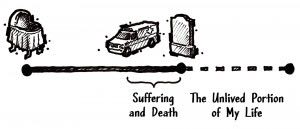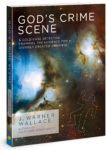
“Is God willing to prevent evil, but not able? Then he is not omnipotent. Is he able, but not willing? Then he is malevolent. Is he both able and willing? Then whence cometh evil? Is he neither able nor willing? Then why call him God? ”
Does the persistent existence of evil exclude the reasonable possibility God exists? No. As I’ve described in God’s Crime Scene (Chapter Eight – The Evidence of Evil: Can God and Evil Coexist?), I offer an explanatory filter built on seven considerations related to the existence of evil, the nature of the universe, and the desires of God. One important consideration we must consider when evaluating the potentially exculpatory nature of evil is the nature of life, particularly if, as Christians believe, life extends beyond the grave.
Evil and suffering are typically experienced and understood within the context of one’s life. For thirty-five years an atheist, I thought of my life as a “line segment” spanning two points: my birth and my death.

All Illustrations from God’s Crime Scene
I hoped for a life (a “line segment”) of approximately ninety years. In the context of this span of time, if I had developed cancer in my forties, I would have been angered by the amount of time stolen from me as I battled the disease. In fact, if I had been diagnosed with a terminal disease at that age, I would have been outraged to be deprived of fifty percent of the life I expected.

If theism is true, however, and we are more than mere material beings, life is not a line segment. Life is, instead, a ray stretching from the point of our birth, passing through the point of our physical death, and extending to an eternal life beyond the grave.

Now consider any experience of evil, pain or suffering in the context of an eternal life. You may, for example, remember the painful vaccinations you received as a child. If you’re reading this book at the age of thirty, the small period of your life occupied by the pain you experienced during those vaccinations has been long outdistanced by the years you’ve lived since then. As time stretched on from the point of that experience, you were able to place the pain within the larger context of your life. You don’t even remember it now.
If dualism is true, we are both material and non-material, eternal beings who will live forever. Our experience and understanding of pain and evil must be contextualized within eternity, not within our temporality. Whatever our experience here in our earthly life, no matter how difficult or painful it may be, must be seen through the lens of forever. As our eternal experience stretches beyond our struggles in this life, our temporal suffering will become an ever-shrinking percentage of our consciousness. The anguish we may have experienced on earth will be long outdistanced by the bliss we’ll experience in eternity.

When someone asks me why something bad or evil has occurred (particularly when an evil act involves an innocent child), I am hesitant to offer a quick answer, even if this answer is evidentially or philosophically accurate. The truth related to evil is always far more complex and inter-related. As I describe in God’s Crime Scene, there are seven considerations we must weigh and evaluate when trying to explain any act of evil. One of these considerations involves the nature of life and eternity. If the Christian worldview is true, evil must be assessed through the lens of eternity, not through the limited perspective of our mortal lives. And eternity changes everything. If the Christian worldview is true, evil must be assessed through the lens of eternity, not through the limited perspective of our mortal lives. And eternity changes everything. Click To Tweet

J. Warner Wallace is a Dateline featured Cold-Case Detective, Senior Fellow at the Colson Center for Christian Worldview, Adj. Professor of Christian Apologetics at Talbot School of Theology, Biola University, author of Cold-Case Christianity, God’s Crime Scene, and Forensic Faith, and creator of the Case Makers Academy for kids.
Subscribe to J. Warner’s Daily Email
J. Warner Wallace is a Dateline featured cold-case homicide detective, popular national speaker and best-selling author. He continues to consult on cold-case investigations while serving as a Senior Fellow at the Colson Center for Christian Worldview. He is also an Adj. Professor of Christian Apologetics at Talbot School of Theology, Biola University, and a faculty member at Summit Ministries. He holds a BA in Design (from CSULB), an MA in Architecture (from UCLA), and an MA in Theological Studies (from Gateway Seminary).
































